December 16, 2017 10:30 PM
Sun Narin
Julia Wallace
voa
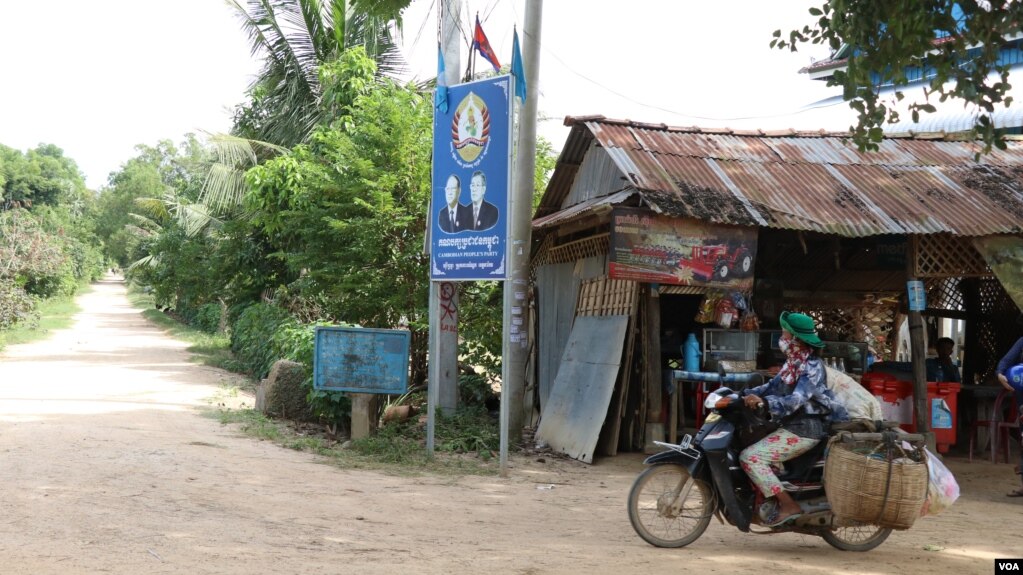
A sign bearing the Cambodian People's Party logo and the faces of Prime Minister Hun Sen and National Assembly President Heng Samrin in Prey Khla commune, Takeo province, Nov. 27, 2017.
PREY KHLA COMMUNE, TAKEO PROVINCE, CAMBODIA —
It’s a beautiful day in this rural hamlet, bright and breezy, alive with the prosperous thrum of the annual rice harvest. But it’s hard to escape the feeling that we’re being watched — because we are.
A police officer stands posted near the entrance of the home of a provincial opposition party official, eyeing Voice of America journalists as they enter. The interview is abandoned for the time being. Six hours later, a different officer has taken his place, still watching.
At the home of another opposition member, shortly after journalists arrive, a portly official with the ruling Cambodian People’s Party (CPP) pulls up and interrupts, wearing a cowboy hat and a scowl. The interviewee had been explaining that he was nervous because he thought he was being watched.
Later, the same local official accuses VOA reporters of practicing journalism “without a letter of permission,” and reports their presence to his party boss, complaining that they had been “interrogating” people.
This is just a taste of the surveillance that opposition party members at the lowest levels have been under since the government-engineered dissolution of the Cambodia National Rescue Party (CNRP) on November 16, rendering Cambodia a de facto one-party state.
But for them, the surveillance is just the beginning.
In interviews with VOA, more than two dozen former members of the opposition described barrages of threatening phone calls, court summonses and visits by police.
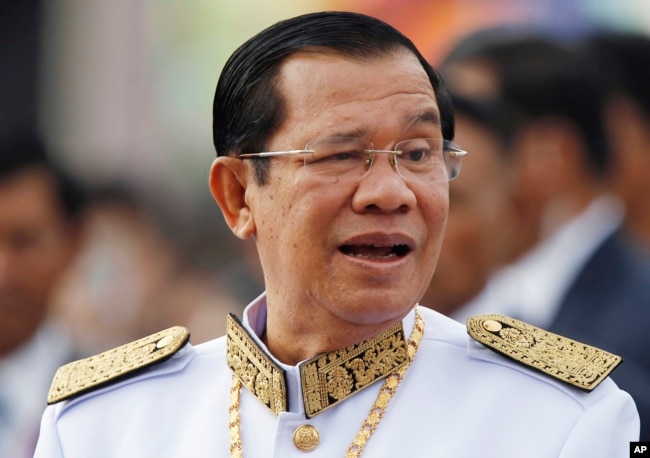
FILE - Cambodia's Prime Minister Hun Sen waits to attend Independence Day celebrations in Phnom Penh, Cambodia, Nov. 9, 2017.
This harassment was to induce them to defect to the CPP and renounce their former allegiance. This was a key plank of a campaign Prime Minister Hun Sen announced October 22, two weeks after his government filed a motion to dissolve the CNRP and render it effectively illegal, on the ground that it had attempted to topple the government.
The premier dubbed it the “win-win policy,” a reference to his 1990s push to eliminate the Khmer Rouge by promising its fighters that they could keep their positions and the resources they had accumulated only if they defected to the CPP.
‘You are a chicken egg’
International media coverage of this year’s political crackdown has focused on its effects on the party’s top leaders. Village and commune officials, however, many of whom do not speak English and have few resources and connections to draw on, bore the brunt of the pressure to defect — pressure that often deployed the full force of the country’s police, administrative structure and judicial system.
According to interviewees, threats against them increased over the course of November, as the prime minister’s defection campaign initially found few takers. Those who could afford to flee Cambodia did. The deadline for defection was extended several times.
Finally, in a climactic address to ruling party officials in late November, Hun Sen ordered his loyalists to obtain defections by any means.
“So do this work as soon as possible, and try to do it day and night, mobilizing any forces [necessary] to make this work successful,” he said in the speech, which was later leaked online. “Break the legs of the CNRP at the local level.”
Although the government-imposed deadline for defection has now passed, the surveillance continues, according to interviewees; the surveillance now apparently is designed to ensure that the party cannot reconstitute its local networks, and members cannot easily support each other.
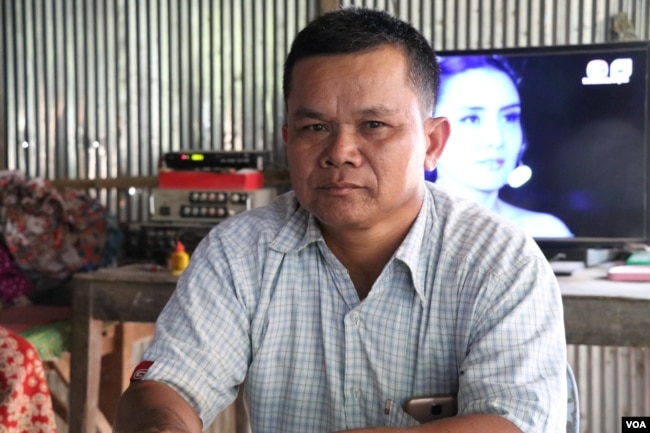
Oum Sam Oeun, 48, who served as a CNRP commune councilor until the party was dissolved, said he faced pressure to defect to the CPP, but refused to do so, photo taken Nov. 27, 2017
Oum Sam Oeun, a district official in Takeo who resisted defection, said that whenever more than three opposition supporters went to a coffee shop, the CPP-aligned village chief immediately showed up.
Quoting a Khmer proverb about the futility of opposing the powerful, the village chief told him, “You are a chicken egg. You cannot go up against a stone.”
Broken legs
The most vulnerable targets, commune councilors, reserve candidates and grass-roots organizers, almost invariably have the fewest options.
Unlike their CPP counterparts, who have spent years enmeshed in a party apparatus that amply rewards the loyal, CNRP officials often have few resources other than small farms and few social ties outside their immediate communities. They cannot flee.
Meng Sopheary, the CNRP’s head of electoral affairs, tried to collect information about the intimidation of local party officials. She told VOA she stopped after the dissolution of the party because too many members had fled or were afraid to communicate with her.
However, it is clear that the harassment has been pervasive and widespread.
In Kampong Chhnang province, all of the 42 councilors who ultimately defected to the CPP were under surveillance by police, who would show up outside their homes and watch them, provincial party chief Keo Thai said. Three commune councilors fled the country, while the rest hid at relatives’ houses.
One person, the chief of Chronouk commune, was sued after signing an official document November 17, the day after the CNRP was officially dissolved. He agreed to defect so the case would be dropped, Keo Thai said.
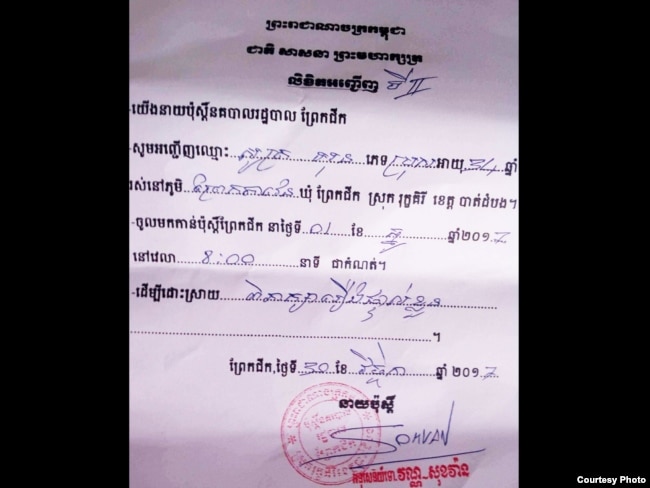
A police summons dated Nov. 30, 2017, orders opposition councilor Soth Un, from Battambang province's Prek Chik commune, to appear at the commune police office on December 1. The summons says that the police want to discuss "a personal issue" with him.
In Battambang, three commune councilors were summoned by police to “discuss a personal matter,” while another one was served with papers accusing him of murder, according to provincial chief Chea Chiv, who said that all them ultimately defected.
In another case, the deputy chief of Prekloung commune was accused of a crime for displaying a CNRP banner after the formal dissolution of the party, but was told that the charges would be dropped if he defected, Chea Chiv said. The deputy chief defected.
In Preah Sihanouk province, commune councilors were subject to visits from police and local administrators and threats of prosecution or jail time if they did not defect, Sisowath Thomico, a member of the CNRP steering committee, told VOA shortly after returning from a trip to assess the situation there in late November.
Anybody with a weak point, whether it was an open court case, a relative in trouble with the law or a personal vice, was vulnerable to being pressured into defecting, he said. The dozen people who ultimately defected felt that they had no choice.
“It was a way to protect themselves, to get away from being imprisoned or killed,” Sisowath Thomico said. “As far as the other people are concerned, those who have no weaknesses whatsoever, they just fled away, to see their family [in other areas] and to keep their family from pressure.”
In one case, a deputy commune chief in Battambang was summoned to court over a three-year-old family land dispute he had believed was resolved. Horn Chhoy, 65, said he was told that if he defected, the case would be dropped. Instead, he chose to flee.
“I know they don’t have good intentions,” he told VOA by telephone from a location he declined to disclose. “Now white becomes black and black becomes white.”
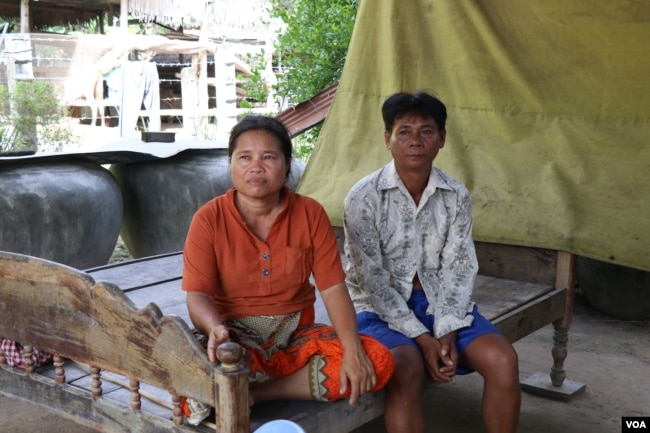
Keo Eat, 52, a deputy Prey Khla commune chief, decided to join the ruling Cambodian People’s Party after being served with a court summons shortly before the deadline to defect. He's shown with his wife, Keo Sarin.
The egg and the stone
Keo Eat is a chicken egg. He is poor and has always been poor. He spent his childhood under the Khmer Rouge regime and his teenage years in a border refugee camp. From there, he was tapped as a foot soldier in the civil war of the 1980s. The only reward he took from his two decades of fighting were the tattoos that cover his stomach and back and are intended to protect him from harm.
As peace took hold in the 1990s, he demobilized and managed to obtain a tiny plot of land, where he and his wife eked out a living farming rice. They had almost no money, but they found meaning in the grass-roots organizing they threw themselves into on behalf of the fledgling Sam Rainsy Party, which had begun challenging Hun Sen’s government on an anti-corruption platform.
As the years went by, that party merged into the bigger CNRP, which began to pose a serious electoral threat to Hun Sen, gaining nearly 50 percent of the country’s vote in the 2013 national elections. In Takeo, Keo Eat was drafted as a candidate for local office. The 52-year-old says he was approached by the ruling party with job offers several times, but he refused.
His years of hard work seemed to be paying off after nationwide local elections in June this year, which saw an unprecedented influx of opposition party members into positions in commune councils across the country. Keo Eat became a deputy commune chief.
Then the drive to dissolve the CNRP began. At least four times in October and November, Keo Eat says he was visited late at night by delegations of provincial police and soldiers, who surrounded his house and photographed it from multiple angles. Terrified, he and his wife huddled upstairs with their sick baby granddaughter.
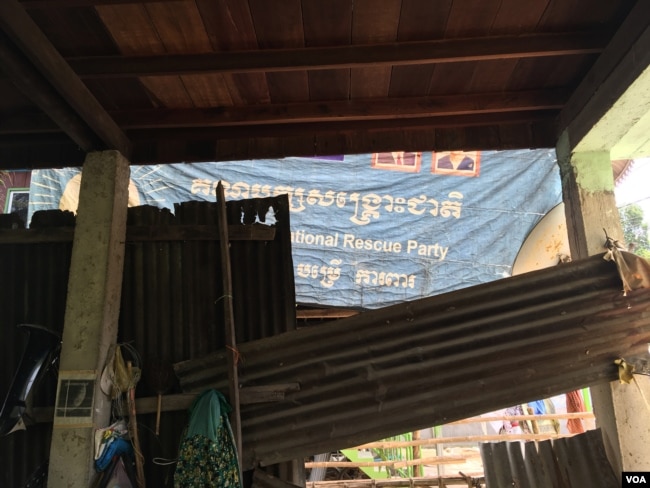
After the opposition party was dissolved, Keo Eat was ordered by police to take down from his home all the banners bearing its logo. He complied but turned one inward as a gesture of defiance, Nov. 27, 2017.
After the party was dissolved on November 16, local police forced the family to take down the CNRP banners they had displayed. They mostly complied, but Keo Eat defiantly turned one of them inward instead of taking it down.
The head of Prey Khla commune came to him and asked him once again to defect.
“Still, I did not,” Keo Eat recalled.
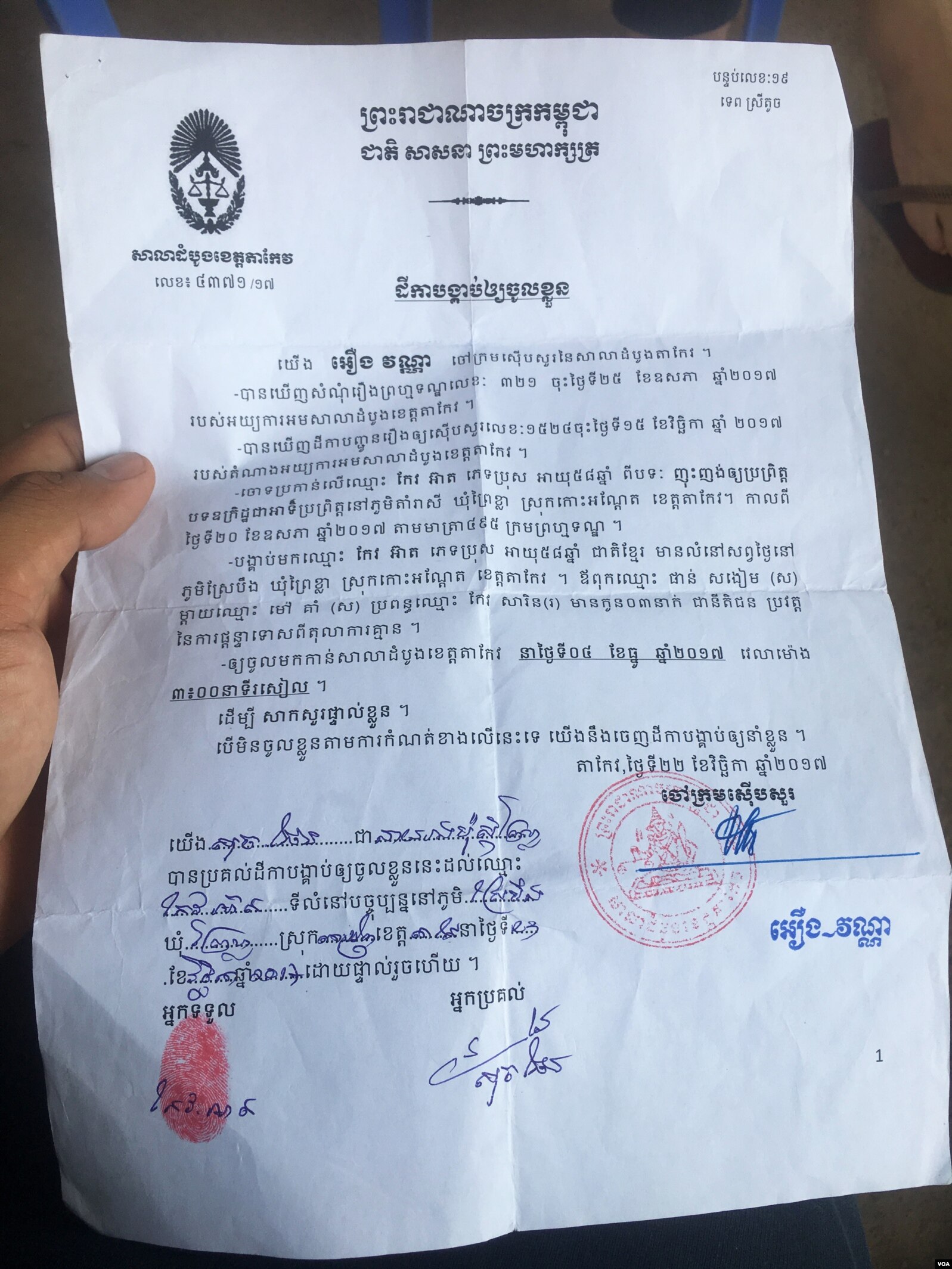
A summons dated Nov. 22, 2017 orders opposition commune councilor Keo Eat to appear at the Takeo Provincial Court on December 4 on charges of felony incitement, Nov. 27, 2017.
On November 23, the ruling party delivered its final blow: Local police delivered Keo Eat a summons ordering him to appear in court on charges of incitement, which carries a penalty of two years in prison.
The charges stemmed from an incident during the local election campaign in May, when a CPP and a CNRP parade collided and Keo Eat allegedly called the ruling party “stupid.” A CPP commune councilor promptly sued him and five other opposition officials, seeking $5,000 in compensation from each. But after they appeared in court, they thought the case had been dropped.
After receiving their court summonses, Keo Eat and his co-accused frantically consulted with their families and party higher-ups.
“You get jail for five years or salary for five years — which one is better?” Keo Eat asked his district party boss, Chan Leap, as they wrestled with the decision.
In addition to his fear of being jailed, he had no obvious source of income other than the $170 monthly salary paid him as a commune official. He said he might have to become a migrant construction worker or a laborer in some richer man’s rice field.
When the officials were first sued in May, the CNRP had provided them with moral and legal support, finding them a lawyer and paying for the gasoline they needed to ride their motorbikes to the provincial capital.
Now there was no more party to help them. Even being seen with other ex-CNRP members could get them in trouble.
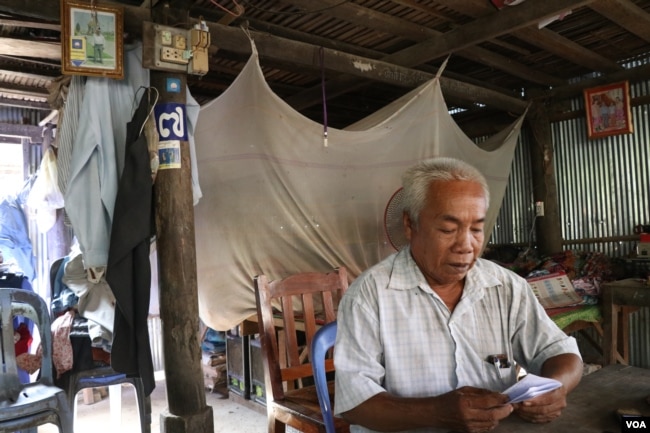
Chan Leap, 66, a district official for the opposition Cambodian National Rescue Party until it was dissolved in mid-November, sits at his house in Takeo province. He said he did not defect to the ruling Cambodian People’s Party, but urged others to do so.
“I couldn’t solve this problem for them,” Chan Leap said. “I didn’t know how to find a lawyer. So I prepared them to defect.” Of the six men who were served summonses, provincial CNRP officials suggested the three highest-ranking men join the CPP, and work within the system to keep the others out of jail.
In an interview with VOA on November 25, Keo Eat said he was still agonizing over what to do.
“I don’t know what to decide,” he said. “If I don’t defect, it will be hard to solve. And nobody can help me now.”
On November 26, in the last few hours before the final deadline, Keo Eat agreed to join the CPP. “I decided to defect, just to stay alive,” he said.
‘Traitors must be watched’
The day after he defected, Keo Eat sat with his wife and granddaughter underneath his stilted house, bewildered and shirtless, his protective tattoos on full display.
He said he wanted to speak honestly about his situation but was terrified of getting himself into trouble.
“I think they knew there was no pressure that could force me to defect except for the court,” he began.
Then a large man pulled up on a motorbike. Keo Eat and his wife fell silent. The visitor was Pheung Phan, the acting CPP chief of Prey Khla commune.
“Tomorrow we will go to take the oath of loyalty,” he told Keo Eat. “You can write it out and then I will watch you swear.”
After the official drove away, Keo Eat said he no longer wanted to discuss his political views or the circumstances of his defection.
His wife, however, asked if she could be interviewed. Fast-talking and sharp-minded, Keo Sarin has been a passionate CNRP supporter for as long as her husband.
“I’m just a citizen and I have the right to speak,” she said fiercely, urging a reporter to switch on a voice recorder.
But after launching into a torrent of speech describing her feelings about the government, she glanced at her husband again and stopped talking. Her face contorted. She asked to retract her statements, for the sake of her family’s safety.
“Now my husband is a CPP official,” she said.
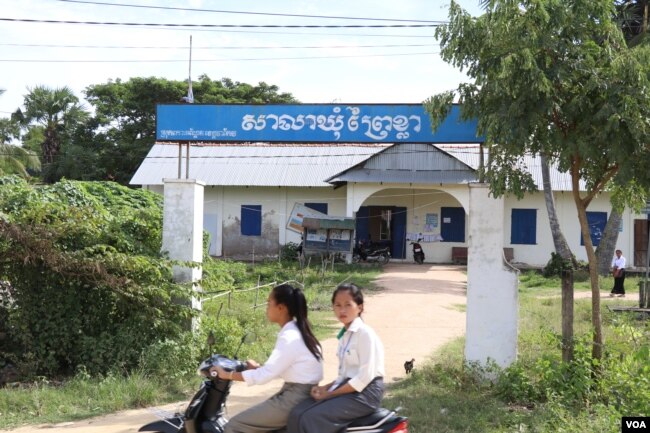
Students drive past the Prey Khla commune office in Takeo province, Nov. 27, 2017.
A short drive down the road from Keo Eat’s house, Pheung Phan sat alone behind his desk in the Prey Khla commune office.
He demanded to know if journalists had obtained a letter of permission to be in Prey Khla. Then he placed a phone call to his boss, the party chief for the district.
“VOA has come to interrogate me,” he said, using a term widely used by the Khmer Rouge to refer to their torture sessions.
He hung up the phone and said he had been told not to answer any questions.
“He [the district party chief] said, ‘No VOA coming around here,’ ” Pheung Phan said.
Contacted later for comment, Takeo Provincial Court spokesman Lim Sokhan, a CPP appointee, said summoning Keo Eat and his colleagues at the height of the defection campaign was simply procedure, and was not intended to pressure them.
However, Sun Thorn, the deputy police chief of Takeo province, readily confirmed that ex-CNRP officials were all under surveillance.
He said this was justified because they were “traitors” for supporting the political opposition.
“It is normal that traitors must be watched,” he said.
“We just only follow what Samdech Techo says,” he added, using Hun Sen’s formal title. “I agree with Samdech Techo. That’s it. Village and commune authorities also follow Samdech Techo because the villages and communes belong to Samdech Techo.”
A feeling of utter defeat
Although Hun Sen appears to have gotten his way for the moment, questions remain about the long-term viability of creating what is effectively a single-party state.
How loyal will the ruling party’s reluctant new foot soldiers be? Without a free and fair electoral process, what will serve as a release valve for the nearly 50 percent of Cambodians who voted for the CNRP in the June elections?
The premier’s first “win-win policy” was so successful that Hun Sen often touts it as his biggest accomplishment. He is in the process of building a lavish “Win-Win Monument” in Phnom Penh, commemorating himself.
In the 1990s, the Khmer Rouge defectors were leaving behind what had become a desperate scramble for existence, fighting for their lives in deteriorating, malaria-ridden jungle strongholds.
Today’s opposition supporters had been enjoying a constitutionally guaranteed right to express themselves politically, against a background of increasing prosperity. It is a right Cambodians have increasingly taken for granted in a country that has not known war in a generation.
“It is not clear whether these defections will be true defection with minds, ideas and hearts 100 percent,” political commentator Meas Nee said. “Due to pressure, some defected just for safety, but their hearts and minds don’t change.”
Jonathan Sutton, a doctoral researcher at the University of Otago who studies Cambodian politics, said it was unlikely the 2,603 new defectors would be given positions of trust or power within the CPP.
“They’ll be sort of in between — it really is a case of being between a rock and a hard place,” Sutton said.
Calming Hun Sen’s fears
Still, the defection campaign likely helped calm Hun Sen’s fears of future pro-democracy protests by demolishing the CNRP’s local networks and publicly humiliating its officials within their communities, Sutton said.
That is certainly the case in Takeo, where a senior provincial party official said the CNRP’s structure had been “destroyed” since October.
The official said he had refused multiple attempts to get him to defect, including harassment from police and offers of a lucrative advisory position to the government. Unlike the defectors, he had no obvious weaknesses and has a profession that provides a steady income.
Still, despite his relatively privileged position, he was afraid to give his name or discuss politics in public. Even being interviewed at his home did not feel entirely safe to him. He suggested that perhaps journalists could try visiting him in disguise.
Eventually, the official agreed to speak — in a hut surrounded by grass 20 meters behind his house.
He said that despite having tried his best to “maintain my dignity,” he felt utterly defeated.
“I spent all of my time, my efforts, my money, to support the party,” he said. “Now I have nothing. I feel nothing.”
He said goodbye, and journalists picked their way back along the scraggly underbrush to the street.
A police officer was still there, watching.

No comments:
Post a Comment